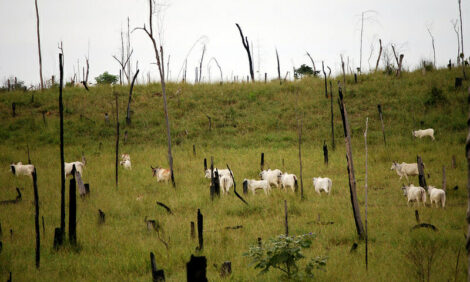



Defra Announces Changes to TSEs Testing
UK - The number of cases of BSE and scrapie, included in a family of brain diseases called Transmissible Spongiform Encephalopathies (TSEs), in Great Britain has continued to fall.Following consultation on TSE responsibility and cost-sharing proposals which ended earlier this year, Defra today announced how testing for TSEs will be managed in future.
In 2007 there were 53 confirmed cases of BSE compared to 37,000 in 1992, and 82 confirmed cases of scrapie, compared to 597 in 1999. Further reductions are expected in 2008. The requirement to destroy cattle slaughtered over 30 months old, under the Over Thirty Months (OTM) Scheme, was replaced with BSE testing in 2005 and the export ban was removed in 2006. Defra has therefore decided that industry will now take control of the cost of collecting and disposing of fallen adult cattle.
There is no increased risk to the public as a result of these changes. Public health measures to protect consumers remain unchanged. Controls in abattoirs, including the testing of cattle and the removal of specified risk material, such as brain and spinal cord, will remain in place, as will controls on feed to protect animal health.
From mid January next year, the free collection and disposal service for adult cattle that have died or been killed on farm will end. To help industry in the transition period, £2m will be made available to the National Fallen Stock Company for cattle that will still need to be tested for BSE. This subsidy will last for a year, after which, the Company will transfer to industry ownership.
Defra will not seek to recover £3.8m as a contribution towards the costs of the Meat Hygiene Service (MHS) as originally proposed and abattoirs will not need to pay for BSE tests until January 2009. The Food Standards Agency is preparing to consult later this year on revised charges for recovering a proportion of the costs of MHS controls. The proposals are expected to include charges of about £0.2m in 2009/10 for the additional controls on cattle that need to be tested for BSE. Laboratories that wish to offer a BSE testing service will be able to do so but they will need to meet the required standards and to pay for the cost of the approvals process with immediate effect.
Farm visits under the voluntary Ram Genotyping Scheme, that since 2001 has provided free genotyping to increase resistance and reduce scrapie, will end in December 2008. The Scheme will close in March 2009 with no new applications accepted from today. The National Sheep Association and the Rare Breeds Survival Trust will take over its semen archive in November 2008. The Scottish Agricultural College will administer a new industry-funded Scrapie Monitoring Scheme from January 2009.


